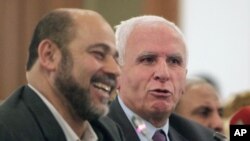The rival Palestinian Fatah and Hamas factions have reached a reconciliation deal. Israeli Prime Minister Benjamin Netanyahu has responded by asking Palestinian President Mahmoud Abbas to choose between peace with Israel, or peace with Hamas.
It was a surprise announcement that came after secret talks in Cairo. The rival Fatah group that runs the West Bank and the militant Islamist Hamas faction that controls Gaza said they have reached an understanding to set up an interim government and hold elections.
Israel responded immediately, with Prime Minister Benjamin Netanyahu making a statement on Israeli television.
Netanyahu said the Palestinian Authority of President Mahmoud Abbas has to choose between peace with Israel or peace with Hamas, which he said seeks to destroy Israel. The Israeli leader said the very idea of reconciliation shows the weakness of the Palestinian Authority that could lead to a Hamas takeover of the West Bank.
The deal could be signed in the coming days. Recent demonstrations in the West Bank and Gaza have been calling for an end to the division between the two factions. Many Palestinians believe a divided leadership is preventing them from facing up to Israel, ending its occupation of the West Bank, and setting up a Palestinian state.
Hussam Khader, a Fatah leader in the West Bank city of Nablus, said, "I believe it will help the Palestinian people and maybe it will be a great step toward our national goals."
However, there is skepticism on whether the deal could bring reconciliation.
Fatah is moderate and has engaged in negotiations with Israel. Hamas' charter calls for the destruction of the Jewish state.
Khader recalls how previous reconciliation attempts have failed, and sometimes resulted in violence. "The problem is very, very deep and there is a distance between Fatah and Hamas in the political level, in the struggle view."
The deal was brokered by Egypt's interim government, which some Palestinians perceive as being more supportive of their cause than that of recently ousted President Hosni Mubarak.
Hillel Frisch is a senior researcher at the Begin Sadat Center for Strategic Studies near Tel Aviv. He questions whether Egypt's support will be significant.
"This is no longer Mubarak's Egypt. This is a much weakened Egypt. No one is quite sure where Egypt is going. It's true that Egypt, the new foreign minister, is talking a different tune, a much more assertive pro-Palestinian tune, but backing him is a much weaker state," said Frisch.
Hamas won a majority of seats in Palestinian legislative elections in 2006. The following year, Hamas militants drove Fatah out of the Gaza Strip after a week of violent clashes.
Hamas, Fatah Reach Reconciliation Deal
- By Luis Ramirez




